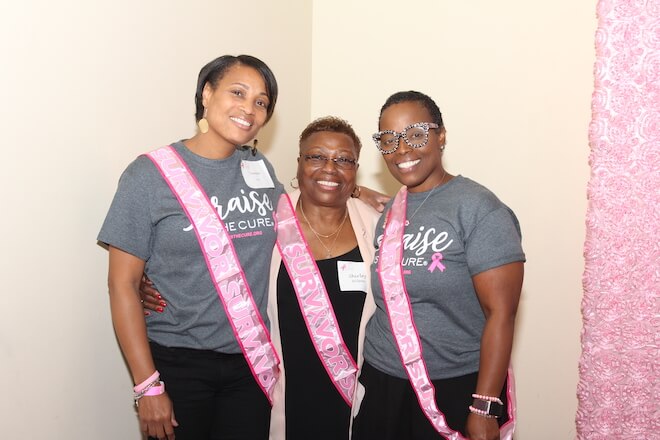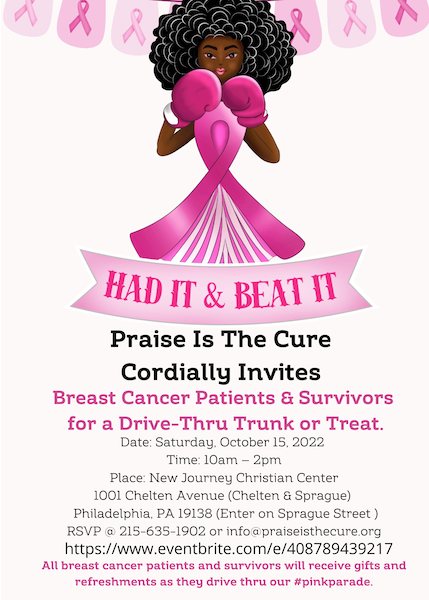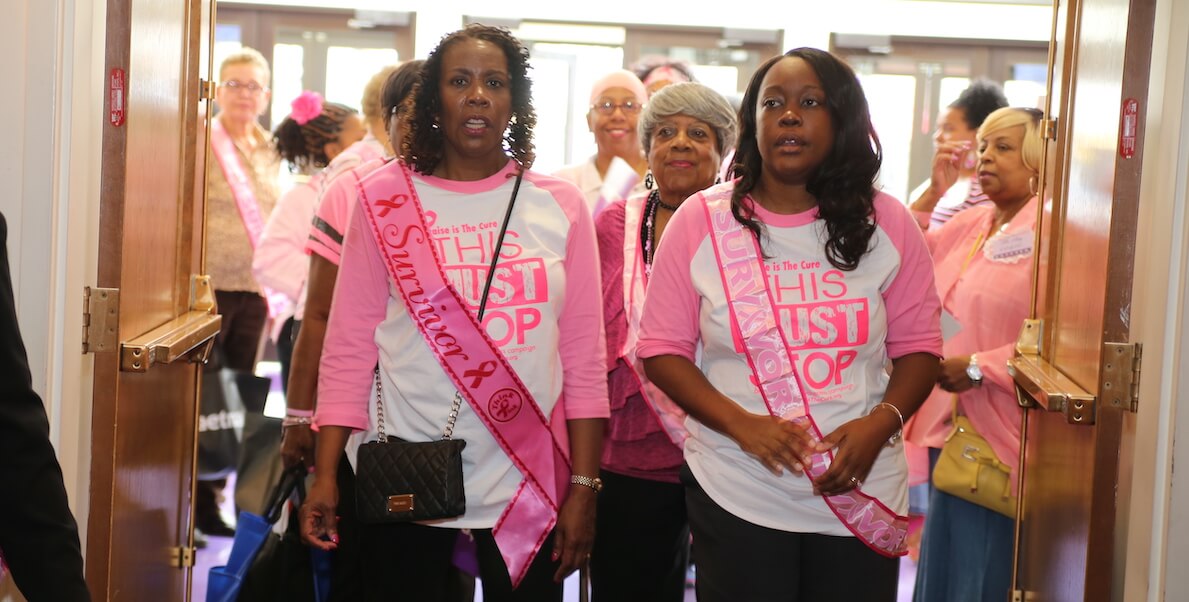In 1988, having just earned her accounting degree from Howard University, Kerri Conner Matchett was looking forward to joining Anita T. Conner & Associates, the accounting and financial services business her mother founded. Matchett was excited to work alongside her CPA mom in the family’s Elkins Park (now Jenkintown) offices.
That is, until things took a tragic turn. Conner, then only 41, was diagnosed with an aggressive form of breast cancer. “The doctors were preparing us for her not surviving,” Matchett recalls. Working side-by-side would have to wait — for her mom’s diagnosis, for a clinical trial treatment implanting stem cells. While waiting, Matchett became a voracious learner of all things breast cancer, particularly breast cancer in Black women.
“That’s when we realized how many more Black women were dying of the disease than any other ethnic group,” Matchett says. “The statistics were really a shock to me.” Prior to her mother’s illness, she knew nothing about breast cancer — or anyone who had it.

From 1988 to 1992, around the time Conner was diagnosed, the Center for Disease Control (CDC) reported the mortality rate among American women with breast cancer was 26.2 percent, with Black women 40 percent more likely to die from breast cancer than White women. Twenty years later, in 2019, the CDC reported mortality rate for Black women with breast cancer was 29 percent; the mortality rate for White women was 20 percent — now 45 percent higher in Black women.
The women said they also discovered there were limited resources for Black women — and dedicated themselves to improving access to breast cancer care for women in their community.
“We wanted to get the word out that [breast cancer] doesn’t have to mean a death sentence,” Matchett says. In 2006, to the mother and daughter on “a shoestring budget,” says Conner, it was obvious that the best place to reach these women and their families was through church.
Praise Sunday
“In our history, the church was the place for information and women are dedicated to their churches. We knew [that is where] we would reach a lot of women,” Matchett says.
Conner and Matchett called the effort to spread their message Praise Sunday. Each Sunday, especially in the run-up to October, Breast Cancer Awareness Month, they would visit at least one church. They’d go to Salem Baptist in Roslyn, Mount Airy Church of God in Christ at Stenton and Ogontz avenues, Bethlehem Baptist on Penllyn Pike. They would give a two-minute talk, distribute literature, meet parishioners, and honor survivors, who were often dressed in pink. By 2019, Conner and Matchett were visiting 50 churches each year.
“We had no idea it would become as big as it is today,” Matchett says.
The success of Praise Sunday eventually led to Praise Is the Cure (PITC), a breast health nonprofit the women established in 2006. PITC ‘s ultimate goal is that “Black women will have equal access to all breast cancer awareness, intervention, and prevention resources.” One way they do that: Community events and dance performances.
Only a few years into the work of their new nonprofit, life took another awful turn. In 2008, exactly 10 years after her mother’s diagnosis, Matchett, then 33 years old, newly married, and the mother of a young toddler, felt a lump. But she was now very educated on the disease and immediately sought medical advice. After testing, she learned she had stage three breast cancer.
Matchett saw the same oncologist who treated her mother all those years ago. The doctor admitted that although there had been advances since her mother’s treatment, there was still little guidance on treating breast cancer specifically in Black women. “Partly,” recalls Matchett, “because not enough Black women were participating in clinical trials.” The clinical trial her mother took part in had ended because many participants did not survive.
PITC ‘s ultimate goal is that “Black women will have equal access to all breast cancer awareness, intervention, and prevention resources.”
In 2017, long after completing her breast cancer treatments, came more bad news. Matchett, who’d developed a persistent cough, became short of breath. After a dreaded X-ray, she learned her left lung was nearly collapsed with fluid — a result of metastatic stage four breast cancer. “I knew about regular breast cancer but knew nothing about this,” she says. She resumed her learning journey.
Even though Matchett is currently undergoing treatment, she and her mother remain committed to the cause. They are in the thick of this year’s activities, having just concluded their signature event, Praise Sunday. Although they were able to visit only 10 churches this year, Matchett is hopeful they will resume their fuller schedule in 2023.
October: Breast Cancer Awareness Month
This Sunday, October 2, PITC will host a benefit that honors patients and survivors and “is meant to be encouraging and inspirational to anyone, to never give up,” Matchett says. There will be a dance performance by Grace Dance Theatre, whose founder died from breast cancer. Matchett expects roughly 500 people to attend. It will take place at Bryn Mawr College’s TK.
Two weeks later, they will host “Super Saturday” on October 15 from 10am to 2pm at the New Journey Christian Center, 1001 Chelten Avenue. Call (215) 635-1902 for more information. The event will include:
-
- No-appointment-necessary health screenings
- Fox Chase Cancer Center’s mobile mammogram unit. (Appointments are required and space is limited. To schedule one, call (215) 214-1682.)
- “Had it and Beat it,” a drive-through trunk-or-treat with gifts for patients and breast cancer survivors
Jamila Kinsey, 49, is one of PITC’s roughly 50 volunteers and a breast cancer survivor. She and Matchett first met at the dance school their daughters attended, when Matchett hosting a story time for the kids in the class, reading aloud My Mommy Has Breast Cancer, But She Is OK, the book she wrote for young children of breast cancer patients.
In 2013, when Kinsey’s own mother was diagnosed with breast cancer, she began volunteering with PITC. Five years later, Kinsey herself received a breast cancer diagnosis. She credits her early diagnosis to her doctor, who, upon learning her family history, ordered genetic testing. She tested positive for the BRCA1 gene, which is often associated with other cancers — as did her twin sister, Tamika Williams.

Williams opted to have prophylactic surgeries to remove both breasts and her ovaries. The pathology report from the surgery revealed cancer in both breasts. “We have a running joke that I’m the twin that saved the other twin’s life,” Kinsey says. Today, Kinsey, Williams and their mother are doing fine.
Through all of this, Kinsey has learned that breast cancer is incredibly complex. “It’s really more than just getting mammograms,” she says. That is why she is committed to helping PITC educate the Black community about clinical trials, genetic testing, and “questionable mammograms” — mammograms that suggest something’s wrong, but where patients are not told to follow up with an ultrasound.
“Black women are getting cancer at younger ages,” Matchett says, “So we have to know our history and participate in clinical trials. If we don’t, our numbers won’t change, and we’ll continue to die at higher rates.” PITC encourages women to speak up, ask about trials and testing if their doctor does not offer it, and not be afraid to ask for a second opinion on their mammograms. “We want to help people be in charge of their own care,” Kinsey says.
Conner has been cancer free for 20 years; Matchett is undergoing chemotherapy and participating in a clinical trial specifically to help those who are immune compromised build Covid antibodies. They are both devoted to helping other women through breast cancer. There are hopeful signs.
“I have had friends diagnosed with stage zero, or one, and I know it’s devastating, but that is good news because we’re catching it early,” Matchett says. “Maybe we really are making a difference.”
To schedule a mammogram on Super Saturday call (215) 214-1682. For more information on all PITC events, visit praiseIsthecure.org.
Lisa Bryant is a freelance journalist and native of Philadelphia. She is also cohost of the White Canes Connect podcast and serves on a number of community boards that advocate for the disability community.
![]() MORE WOMEN’S HEALTH CARE COVERAGE FROM THE CITIZEN
MORE WOMEN’S HEALTH CARE COVERAGE FROM THE CITIZEN




